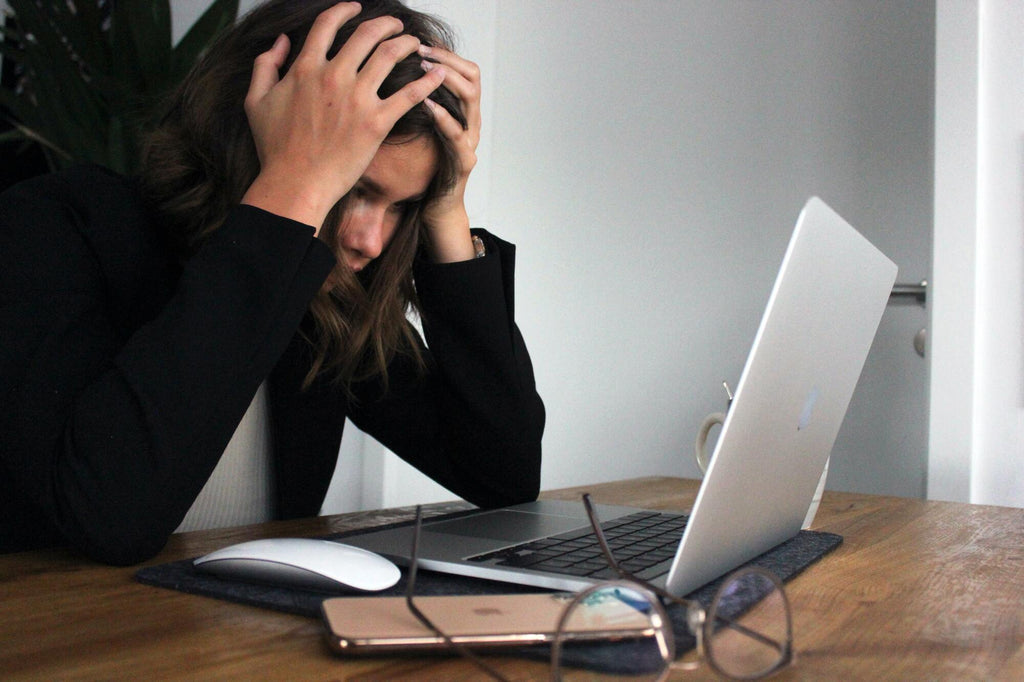Stress and anxiety, advice on to how to deal with them
Stress and anxiety: Our advice to prevent them and our selection of suitable CBD products.
Can CBD help with stress and anxiety?
We have all had to deal with situations of stress, more or less intense. Depending on its cause, our state of form, our mood, stress can be a source of challenge, adrenaline, surpassing oneself. Conversely, the feeling of stress oranxiety can become so intense and pervasive that it can, in some cases, become unbearable and paralyzing.
It's like the body is constantly preparing for something bad that might happen. Thus, this can lead to muscle tension, headaches, nausea or even anxiety attacks. Are there differences between stress and anxiety? How can we limit and relieve them? CBD can it be useful when anxiety invades us?
Stress is a natural physiological reaction responding to our survival instinct. It is also known as the fight or flight response. When we recognize a threat, we release stress hormones which increase heart rate and respiratory rate, while decreasing reaction time and increasing the energy needed for self-preservation.
How Does Stress Work?
Stress is very present in our current modern society. It is true that we all often experience too much pressure. But what exactly is stress? How does it work ?
Stress is the term used to describe a range of physical and emotional reactions we experience to events or situations that will create that feeling of stress.
When you are anxious, How do you feel ? For most people, it feels like a feeling of tightness in the chest. Maybe your heart is racing or your head is getting foggy?
While some level of stress can be healthy and motivating, too much stress can actually be harmful, both physically and mentally.
Making changes to our lifestyle and consulting a professional are important steps to better manage our mental health and therefore find a healthy balance in the face of stressful situations. CBD can also be an ally in relieving stress and anxiety.
Chronic stress or anxiety, what's the difference?
Although stress and anxiety share many emotional and physical symptoms, such as nervousness, tension, headache, high blood pressure and insomnia, they have very different origins.
Stress is not necessarily a bad thing, but prolonged feelings of stress can lead to anxiety disorders and increase the risk of disease or mental disorders.
Stress is often interpreted as a reaction to external factors such as a romantic relationship, financial problems, a professional deadline or an imminent threat. When the threat is resolved, the feeling of stress will dissipate fairly quickly.
When people talk about anxiety, they can be referring to a number of different things. It is sometimes used as a general term for any negative feelings we may experience, such as stress, anxiety, or fear. Anxiety is very similar to stress, but it has a few key differences. It is linked to feelings of fear and apprehension. It can occur when managing stress becomes too difficult and unlike stress, feeling of anxiety persists even after the threat is long gone. It's for overcome these episodes of anxiety that a CBD cure can be interesting.
In the most severe cases, chronic stress can turn into anxiety disorders. Anxiety is a complex feeling, and although it is often seen as negative, it can also be a sign of demand, attention or focus. It's worth understanding what anxiety means to you personally and how we can deal with it in a healthy way.

Signs and Symptoms of Anxiety Disorders
There are many different types of anxiety disorders, but they all involve intense feelings of fear, most often out of proportion to the situation. The most common mental disorders related to anxiety are:
- Generalized anxiety disorder
- Social anxiety
- Obsessive Compulsive Disorder
- panic attacks
- Phobias
Although these disorders often occur together, they can also exist individually. Signs and symptoms of generalized anxiety disorder include:
- Excessive worry
- Mood swings
- Aching muscles
- Fatigue
- Insomnia
- Difficulty concentrating
- panic attacks
- Agitation
The symptoms of an anxiety disorder can be debilitating and detrimental to our daily lives. If you think you or a member of your family may have an anxiety disorder, it is important to see your GP. There are many treatments available that can help you manage these symptoms and lead a calmer life. CBD could be an option for find a balance facing anxiety.
How can stress affect our body?
We might imagine that stress only affects us when we are confronted with it. But in reality, stress can affect many parts of our body. It can sometimes cause recurring health problems, such as digestive disorders, anxiety, headaches or even sleep disorders.
When our brain detects this feeling of stress, it reacts by activating our "stress hormones", adrenaline and cortisol. Adrenaline increases our heart rate and instant energy while cortisol increases blood sugar levels and directs them to essential functions.
Stress at work
Whether you are an executive, a teacher, a waiter, a store clerk, or even in the medical sector, you certainly sometimes feel stress at work. It can come from our boss, colleagues, clients, too much workload or work/life balance, and can harm your health if you don't manage it.
How to better manage stress at work?
If you think stress only affects your mind, think again. The physical effects of stress include headaches, fatigue, stomach problems, sleep disorders and impacts on our libido. The effects on our mental health can include irritability, feeling overwhelmed, restlessness, lack of motivation or concentration.
We often try to cope with stress unsuccessfully by overeating, by consuming alcohol or drugs, smoking, little exercise, throwing tantrums, or isolating ourselves from those around us. All this only adds to stress and weakens our mental strength.

Here are some tips for managing stress at work:
-
Identify the main sources of stress: better stress management begins with our ability to identify the causes in order to better anticipate them. Indeed, we do not all react in the same way to a given situation. Keep a journal for a week (it takes a little time, but it's worth it), writing down the date, time, duration you felt significant stress, and how you responded.
-
Avoid constantly overloading yourself: If the start of the day was busy, you probably arrived at your workplace already stressed. Try to optimize your time in the morning so as not to feel overwhelmed by midday. If you struggle with work-life balance, try not to want to constantly manage both all day. Unless there is a real emergency, prioritize working at your workplace and your private life outside of working hours.
-
Stop multitasking: Although some people are quite good at multitasking, most of us are more efficient by completing tasks one after the other. Dividing our attention between several priorities can mean that we are not doing one of them well, which can be a source of stress.
Remember to take care of yourself at work
-
Play sports : You don't need to run a marathon, a few minutes of physical effort every day or almost every day will have a lasting effect on your stress management. Go for a walk on your lunch break or join a stimulating yoga class after work. Exercise increases endorphin, which has a positive effect on our cardiovascular, digestive and immune systems, and helps support mood.
-
Make time to relax: Not everyone finds it easy to relax, and most of us don't think it's as important as ticking more things off our to-do list. Certainly not. Learning to meditate or finding mindfulness can help you manage stress throughout the workday.
-
Be kind to yourself: being demanding and a perfectionist can of course pay off. But too much permanent pressure can also have undesired effects on our psyche and our well-being, if we never feel satisfied enough. Be positive and take the time to appreciate your achievements, you will undoubtedly be surprised at the well-being it provides.
-
Listen to your favorite music: music softens morals. It can also calm, inspire or energize. At work if adapted to your job or at home, music can help you prevent and alleviate stress.
-
Avoid conflict situations: avoid overly passionate discussions of gossip at work, finances, religion or politics! Participating in these conversation topics can be tempting, but often it weakens us.
- Put a small box of CBD gummies in your drawer. You'll treat yourself to a little sweet treat, and CBD can help reduce your office anxiety.
Le stress parental
Parents rightly often feel stressed. Between work, children, home, family life, occupations are not lacking and one can quickly feel overwhelmed and stressed.
Here are some of the best stress management techniques for overworked parents.
-
Take care of yourself: When you become a parent, your primary goal is to take care of your children and meet their needs. Only this can lead to an accumulation of stress due to the lack of experience or time for oneself. It is very important to keep some time for yourself and your couple.
-
Try mindfulness meditation exercises: This type of meditation aims to have us live in the present moment without interpretation or judgment. Mindfulness exercises involve different breathing techniques, guided visualization, and other practices to help reduce stress. An eight-week affiliate study found that mindfulness meditation can help reduce the inflammatory response caused by stress.
-
Spend some time alone: Finding time for yourself can be extremely good for our mental health. Although it may be difficult to do in a house full of children. Taking time to walk alone or using alone time in the car to focus on your thoughts and feelings can help you "recharge the batteries" and clear your thoughts.
-
Maintain a healthy and balanced life : the time needed for work, children, home, family obligations seem difficult to reconcile with a balanced, stress-free life. However, finding ways to do certain activities can help create a healthy, balanced life for you and your family.
Here are some tips to try to achieve this
-
Limit extracurricular activities: While extracurricular activities are great for keeping kids occupied and distracted, planning and managing too many activities in the week can quickly become source of stress. For children, stress can come from too many commitments at once. As a parent, stress can come from coordinating extracurricular activities and transportation times.
-
Free your mind: when you have “finished” your working day, try to disconnect as much as possible. Work-related stress can only be amplified when brought home. If possible, turn off notifications on your phone and avoid checking your work emails at home too often. At work, try to complete as many tasks as possible in the morning, starting if possible with the most complicated or difficult tasks.

-
Manage your time: management of time plays an important role in our stress level. Optimizing our schedule can significantly reduce stress while helping us live more productively. Make sure you always have a schedule when planning certain things and allow room to avoid constantly “running”. Here are some tips we recommend to improve time management:
-
Prioritize: one way to manage your time effectively is to first prioritize your tasks. Keeping a to-do list can help us with this, and frees the mind by writing down the tasks to be carried out. Most time management professionals advise dividing your to-do list into three categories. The first for things to be dealt with immediately. The second for the tasks to be completed for the week and the last for medium and long term projects.
Family organization
-
Get your children involved: household chores take time. Assigning simple, specific tasks to your child can help them take responsibility, accomplish them and gain self-confidence. In addition, teaching your children to complete certain household chores will be beneficial for their development and maturity. Depending on their age, folding clothes, tidying their room, unloading the dishwasher, taking care of pets, taking out the trash, are all examples of simple tasks that your children can do brilliantly. They will feel proud, empowered and gratified by the work accomplished.
-
Get Organized: If you have a lot to do every day, like most parents, staying organized can seem overwhelming. A great way to stay organized is to create a list like the one mentioned earlier. This list will help you prioritize activities and stay more serene throughout the week. Keeping and filing important documents in one place, filing your digital archives on an online backup (cloud or other), will allow you to find them easily and quickly when you need them.
-
Treat yourself: If the family budget allows it, don't hesitate to treat yourself. It doesn't have to be something huge. Think of something you don't do or treat yourself to often. An activity with the whole family, a cinema, a game, sport, a walk will all be moments of sharing. This will allow everyone to breathe, have fun and strengthen family ties.
Know your stress signals
Everyone experiences and manages stress in their own way. For some, stress can be expressed by bad mood, sadness or anger. Others will experience a lack of motivation, drowsiness, muscle pain, or headaches. Our gut too can show symptoms due to anxiety. Our intestine actually contains our “second brain”. This is the enteric nervous system, which has more than 100 million neurons! It's more than the spinal cord or the peripheral nervous system. It uses more than 30 neurotransmitters and contains 95% of the total serotonin present in our body. Serotonin is the chemical hormone that regulates our mood. The gut and the brain communicate constantly. Unbalanced intestinal flora can therefore cause mild feelings of anxiety.
When we are submerged, the feeling of stress takes hold of us quite quickly. A healthy and balanced diet will help us feel stronger and better manage overwork.
Here are some dietary tips:
-
Rethink your comfort food with healthy eating. Give your body essential nutrients which he needs. Vitamins, minerals, healthy fats, electrolytes, antioxidants and amino acids are necessary to help your mind and body heal. cope better with stress :
-
fermented foods : you can also eat foods rich in probiotics. They help support the growth of beneficial gut bacteria. For example, try unsweetened kefir, kombucha, sauerkraut, kimchi and raw cheese.
-
Antioxidants : They reduce the effects of free radicals, also known as oxidative stress. Try blueberries, strawberries, raspberries, blackberries, cherries, goji berries. Think pecans, artichokes, garlic, green tea, apples, kidney beans and dark chocolate.
-
Healthy fats and omega-3 fatty acids : wild salmon, nuts, seeds, avocado and coconut oil. You can also add high quality fish or krill oil to tone your body.
-
Minerals and electrolytes like calcium, magnesium and zinc. They help you sleep better and relax. Foods include beans, nuts, wild salmon, oysters, avocados, nuts, unsweetened yogurt, dark green leafy vegetables, and bananas.
-
Avoid sugar, gluten and processed foods as much as possible.
Simple ways to manage stress and mental health
We all experience stress, more or less intense, in our daily lives. It can be useful to know some techniques to deal with it to keep a good mood and serenity. Here are some ideas to help you.
-
Spend at least 15 minutes a day outside. Nature has a beneficial impact on our morale and allows us to find our inner peace and the feeling of happiness. Researchers believe that nature allows us to disconnect and relax. A study of American college students who experienced "extreme anxiety" found that spending at least 10-30 minutes outdoors significantly lowered cortisol levels, heart rate, and lowered their levels of mental stress.
-
Play sports to develop resilience to stress. Physical exercise, beneficial for the body and mind, is an excellent way to improve our mood and limit our anxiety. Health professionals recommend 30-60 minutes of physical activity at moderate intensity to prevent stress. Sport is undoubtedly the simplest and most effective way to increase our endorphin levels. Researchers believe there is a link between poor blood flow to the prefrontal cortex (the part of the brain that regulates our emotions and stress) and anxiety and chronic stress. A study has shown that exercise neutralizes certain physiological markers of stress. Exercise increases cerebral blood flow, allowing us to become more resilient in the face of difficult situations.
Practicing deep breathing exercises facilitates relaxation:
Often when we are stressed, anxious, or overwhelmed, we can have trouble breathing and feel a sense of tightness. Breathing exercises can be a very effective way to calm our minds and bodies. It is one of the oldest relaxation techniques with many proven benefits. Deep abdominal breathing exercises are simple, easy to learn, and can be done anytime, anywhere to provide near-instant stress relief. Another simple technique, slow breathing, helps reduce stress, heart rate, and blood pressure.

-
Share good times with friends. Having strong social connections is an asset and a strength in difficult times. Having a reassuring companion can reduce feelings of loneliness and symptoms of depression. Do not hesitate to speak freely about it to your friends and family. They can be strong supports when you are going through a too intense period. Also consider help from a professional therapist or counselor if you feel the need. You don't have to face chronic stress or anxiety alone.
-
Try taking these natural dietary supplements to support your mental health. There are a number of dietary supplements that can help reduce stress. Let's mention magnesium, Omega 3 fatty acids, probiotics. Let's not forget cannabidiol and other hemp-based cannabinoids. Vitamins and minerals are necessary for the normal functioning of all cells in the body. They allow the regulation of mood and stress-related systems. Supplements like ashwagandha, L-theanine, and magnesium are all natural compounds that improve our body's ability to regulate our stress.
Healthy ways to reduce stress
Mental health is a complex, personal and often misunderstood subject. In the past, it has been plagued by stigma and misinformation. As we learn about mental health, we understand that it is an integral part of our overall health. Mental disorders can be treated effectively through lifestyle changes, therapy, medication. We discover several published studies regarding the potential benefits of cannabinoids on mental health. The pillars of acquiring good stress management skills are the adoption of balanced lifestyle habits. It also requires healthy social relationships, and adopting a more positive view of your situation. If you are experiencing periods of intense stress and anxiety, it is strongly recommended that you do not go through them alone.
CBD and mental health
Mental health and well-being are in the spotlight of our times. More and more people are experiencing high levels of anxiety and stress. Take a look at some of the most asked questions about CBD and anxiety below to understand how CBD can play a promising role.
Introduction to the endocannabinoid system
The body has a vast system of receptors, called the endocannabinoid system (ECS). The endocannabinoid system is perhaps the most valuable biological system for maintaining health and vital functions. There are two main types of receptors, cannabinoid receptor 1 (CB1) and cannabinoid receptor 2 (CB2). While our bodies make compounds called endocannabinoids, hemp produces phytocannabinoids that stimulate our receptors. The ECS influences a wide variety of physiological processes. Scientists believe that its primary role is to support the body in establishing and maintaining good health. These plant cannabinoids naturally bind to ECS receptors. Many of them are found in regions of the brain that regulate mood, stress, sleep or fear.
Can CBD help to limit anxiety and stress?
CBD has been studied for several years for its effects on occasional anxiety. Most research is preclinical or animal studies. However, human studies on CBD and anxiety have increased in recent years. The results are very promising.
Studies on CBD and anxiety
A 2015 CBD study concluded that CBD has significant potential for anxiety. Additionally, a randomized controlled study conducted in 2011 replicated a situation likely to cause anxiety in most people, public speaking. Participants were divided into two, a CBD group or a placebo group. Their level of situational anxiety was measured using self-reported objective and physiological measures (e.g., heart rate).
The group that received CBD showed less stress during public speeches than the group that received a placebo. It has been demonstrated thata full-spectrum CBD extract successfully manages moments of anxiety. This with a much lower CBD intake than patients taking CBD isolate. That's because full-spectrum extracts contain beneficial terpenes and cannabinoids. That's what we call the entourage effect. These molecules, such as CBN and the CBG is not found in CBD isolates.

Which CBD to consume to try to reduce anxiety?
How you consume hemp extract containing full-spectrum CBD is up to your preference. A few drops of CBD oil under your tongue is one of the most effective ways to absorb CBD quickly to combat anxiety. Choose your favorite flavors so that the tasting is perfect. Oil is one of the practical formats to easily consume and measure its consumption. However, others prefer the convenience of capsules and capsules containing CBD oil or in the form of candies and gummies.
Please note that the potential benefits of CBD oil (absorbed through the mucous membranes in the mouth) are faster and therefore useful for anxiety attacks. Capsules, candies, and infusions are absorbed more gradually by the digestive system.
How much CBD to consume to reduce anxiety?
As is often the case, there is no universal rule. It depends on several factors such as age, weight, height, expectations, etc. You can start with small amounts 1-2 times a day. Then possibly increase gradually if you feel the need and until you obtain the expected results. Once the correct dosage has been assessed, there is no point in increasing it further. We all have our own "sweet spot" based on our own body chemistry. Establishing the right amount adapted to your needs constitutes the basis of a beneficial well-being routine.
























